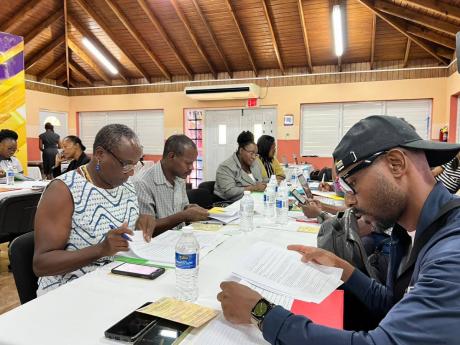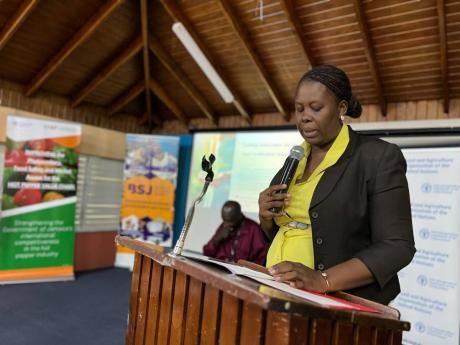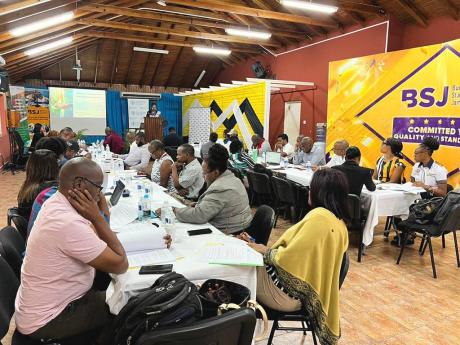FAO, Government advance framework for national seed certification system
The Food and Agriculture Organization of the United Nations (FAO), in collaboration with the Government of Jamaica, is supporting the development of a national seed certification system to increase the supply and access to high-quality seeds for greater agricultural productivity. The Improving Phytosanitary, Food Safety and Market Access opportunities Along the Hot Pepper Value Chain project hosted a seed certification validation session on June 24 at the Bureau of Standards Jamaica.
The project presented the first draft of the Technical Drafting Instructions of the Seed Regulation while facilitating input from key seed certification stakeholders. Participants included members of the National Seed Committee; the focal group for the implementation of the seed certification programme for hot peppers; representatives from the Ministry of Agriculture, Fisheries and Mining; Bureau of Standards, National Certification Body of Jamaica, input suppliers, seed producers and farmers.
The activity contributes to the implementation of the National Seed Policy and Action Plan which focuses on the development of a seed system that ensures the availability and accessibility of high-quality seeds. The project aims to support this for the hot pepper sub-sector through the use of higher-quality seed production and techniques and improved varieties.
FAO seed certification consultant, Dr Lisa Myers Morgan, guided the drafting instructions for the regulations. According to Myers Morgan, the regulations will establish comprehensive standards and procedures for seed certification in Jamaica. They cover the entire process from field production to marketing, ensuring high-quality seeds that meet international standards.
The validation session explored key components of the regulation which include phases of certification, administrative responsibilities, field inspections, sampling and testing protocols, labelling requirements, and quality-control measures.
A national seed-certification system ensures consistent seed quality and genetic purity, providing farmers with reliable, high-yielding seeds. This uniformity enhances agricultural productivity, supports national food security, and boosts the economy through increased farm profitability and export potential.
Additionally, certified seeds help control seed-borne diseases and encourage the development of new, adaptable crop varieties, contributing to the overall health and innovation of the agricultural sector.
Despite the growing demand for Jamaican hot peppers locally and internationally, challenges persist with the compliance and application of international food safety and phytosanitary standards, as well as consistent production of sufficient quantities and supply of high-quality hot peppers.
The regulation will ensure quality assurance instruments, as well as seed quality control standards and protocols for the multiplication of seeds by commercial actors. Increased compliance is expected to translate into increased earnings for export markets especially in the European Union, United Kingdom, United States, Canada. The annual global production of fresh peppers for export is estimated around 30 million tonnes. However, according to the Ministry of Agriculture, Fisheries and Mining in Jamaica accounts for only 0.04 per cent of this global output.
According to the project manager, Sanniel Wilson-Graham, “all efforts under this project supports and complements the Ministry of Agriculture, Fisheries and Mining’s efforts to implement the national seed policy”.
In addition to supporting the legislative framework, Wilson-Graham further outlined other areas of intervention.
“The project is building out a seed certification programme. This will include assembly of a focal group to ensure resources are targeted to the needs of stakeholders. We are also providing a tailored seed certification training manual, end-to-end guide and a seed certification management database to handle some of the documentation that will be involved in the seed certification process. The project will also support through the capacity development of the research sector, a plant breeding training for technical and research officers, and relevant stakeholders. This training is being done in collaboration with the Caribbean Agricultural Research and Development Institute (CARDI). We are providing Bodles Research Station and private seed suppliers with equipment and tools to assist with seed production. We will also support the Government of Jamaica to be able to cost the seed certification programme.”
In her intervention at the session, director of standards at BSJ, Julia Bonner-Douett, emphasised the importance of the activity outcome as sample for reproducibility and a potential model for the Caribbean.
“Agriculture is a big part of our survival in Jamaica. While we will do this in Jamaica, this is a template that can be reproduced in the region and for other projects.”
BSJ will contribute to the food safety component project and will train stakeholders at different points within the hot pepper value chain.
The Improving the Phytosanitary Food Safety and Market Access Opportunities along the Hot Pepper Value Chain project is funded by the Standards and Trade Development Facility and implemented by FAO in collaboration with the Bureau of Standards, Jamaica, and the Ministry of Agriculture and Fisheries.



